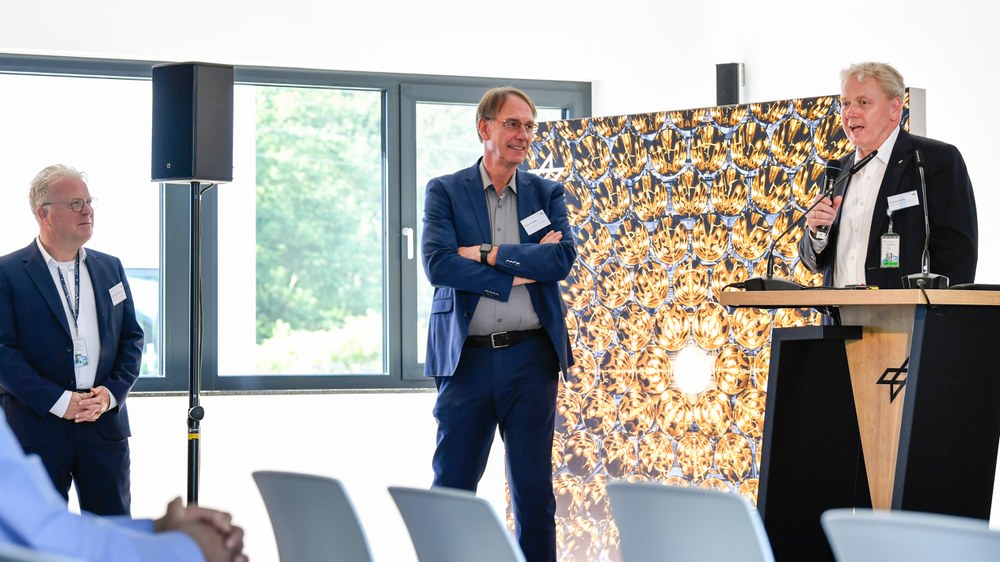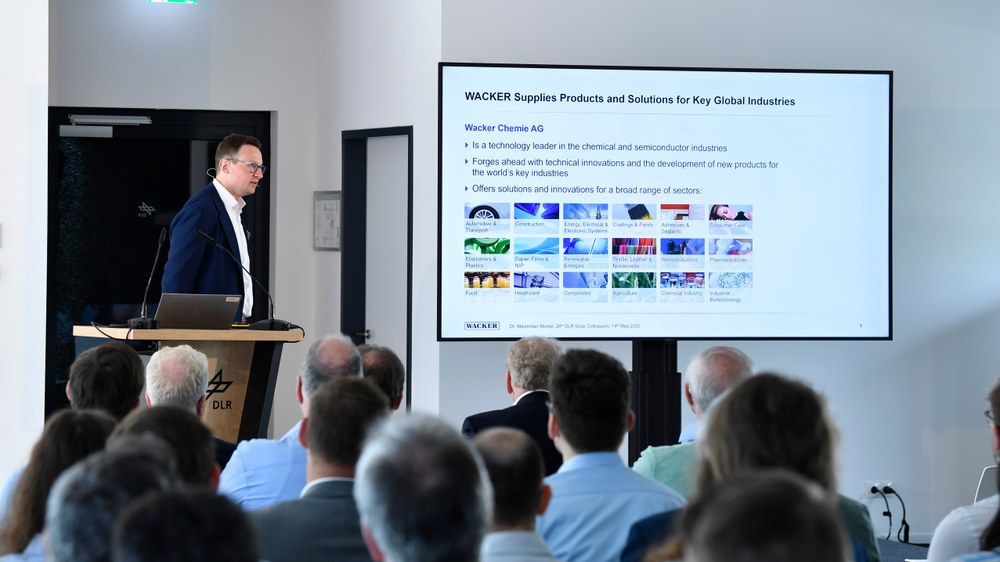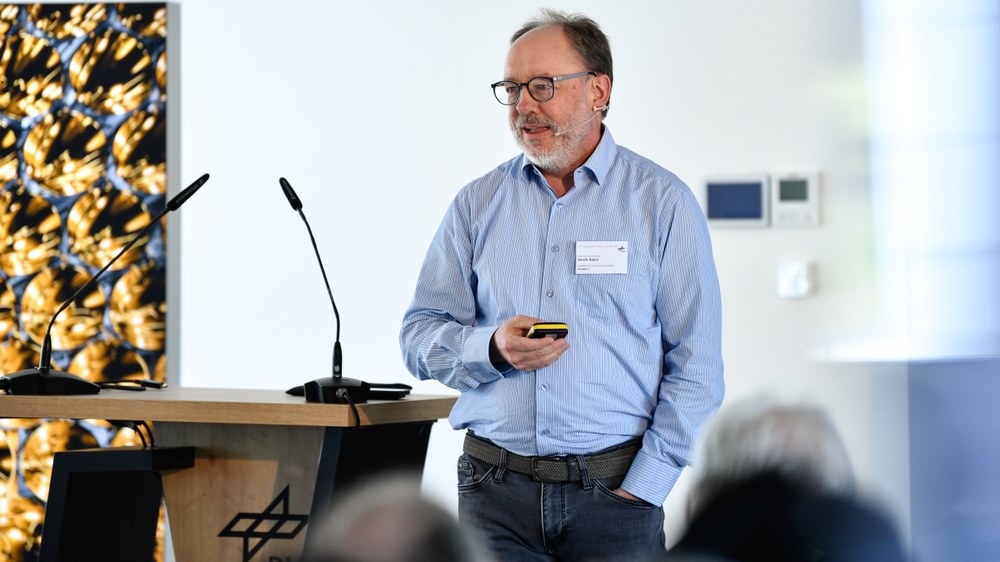28ᵗʰ Solar Colloquium: Solar processes for the chemical Industry



- The 28th DLR Solar Colloquium took place in Jülich with 120 participants under the theme "Solar Processes for the Chemical Industry".
- It brings together experts from industry and research to discuss new methods, tools and technologies for sustainable industrial processes.
The DLR Solar Colloquium took place for the 28th time on Wednesday, 14 May – and for the second time in the new building at the Jülich DLR site. 120 participants accepted the invitation from the DLR Institutes of Future Fuels and Solar Research. The theme of this year's event was “Solar processes for the chemical industry”.
Solar technologies can supply various forms of energy and therefore open up a wide range of possible applications for the chemical industry. These can play a key role in the decarbonisation of the chemical industry, for example, or enable new innovative processes for the production of synthetic fuels. In the course of the event, challenges, solutions and the latest developments in the integration of solar energy into new and conventional chemical processes became clear.

The annual solar colloquium offers the opportunity for an inspiring exchange between experts from industry and research.
Reports and trends from the industry
After a welcome address by Institute Director Prof. Dr Christian Sattler, Martin Kürten from GRILLO Chemicals and Dr Dimitrios Dimitrakis from the DLR Institute of Future Fuels introduced the topic of decarbonisation in the sulphuric acid industry. The presentation of the various applications of sulphur dioxide electrolysis (SDE) in industry highlighted its economic potential. Compared to conventional water electrolysis, SDE is significantly more efficient in terms of electricity consumption and offers promising effects for the production of hydrogen. In this context, Dimitrakis presented the research work on improving the splitting process of sulphuric acid to SO2 using catalytic splitting with renewable heat as well as the potential of using elemental sulphur as an energy source.

Dr Maximilian Moxter from Wacker Chemie AG then spoke about HELIOSOL® heat transfer fluids, which have proven their efficiency in concentrating solar power plants (CSP). Accordingly, their thermal stability ensures reliable, long-lasting operation, which can both increase profitability and reduce the levelised cost of energy (LCOE).
Synhelion SA's DAWN plant has now been in operation for almost a year. Synhelion is demonstrating its technologies on an industrial scale in the solar fuel plant built in Jülich. It produces several thousand litres of solar fuel per year, such as solar aviation fuel, diesel and petrol. David Rutz reported on the first year of operating experience.
New developments and networks
Stéphane Boulanger from John Cockerill Energy presented a new modular CSP concept. This solar solution generates green electricity and/or heat around the clock through cost-effective heat storage with molten salt. Easily deployable, scalable standard cells are used.
Dr Jürgen Dersch from the DLR Institute of Solar Research and Enric Prats from the DLR Institute of Future Fuels spoke about the importance of methanol as an important chemical raw material and energy source. Especially when methanol is synthesised with renewable energies and sustainable CO2 sources, it has considerable potential to contribute to a reduction in carbon emissions. The two scientists presented various projects in which the institutes are involved, aimed at developing and deploying solar methanol production at different scales and geographical contexts.

In his presentation, Prof. Dr Derek Baker from the Middle East Technical University summarised the activities of SolarHub – a cross-border solar energy excellence hub. The EU-funded project aims to strengthen the links between Greek and Turkish ecosystems and drive innovation in solar energy, with a focus on the the agrofood sector. Part of the presentation was to discuss strategies for the transition to a self-sustaining and agile HelioHub.
Research and infrastructure
Prof Dr Kent Warren from ETH Zurich discussed the latest advances in a thermochemical process for the efficient production of sustainable fuels. It utilises renewable heat sources – in particular concentrated solar power – to efficiently produce hydrogen from water or synthesis gas, a combination of water and carbon dioxide. This approach offers a scalable, carbon-neutral solution for the large-scale production of green molecules.
Dr Nicole Neumann from the DLR Institute of Future Fuels then described the approach of two projects in which the institute is involved, which are developing solar-powered membrane reactors for the production of hydrogen and synthesis gas. Such a membrane technology would also have the potential to close the CO2 cycle.
Dr Clarisse Lorreyte from the DLR Institute of Future Fuels presented projects on the solar conversion of various biomasses for the production of biofuels. These deal with methods for converting dry biomass, such as wood chips, or moist biomass, such as microalgae, using solar energy.

The presentations concluded with an outlook on the test infrastructure being developed at the DLR site in Jülich. Dr Kai Wieghardt from the DLR Institute of Solar Research reported on the new large-scale research level for solar thermochemical processes up to 10 MW, which will be built on the Multifocus Tower and is due to be launched in 2026.
Session chairs Dr Nicole Janotte, Dr Martina Reichert and Dr Jana Stengler led through the programme throughout the day.
The participants of the colloquium then had the opportunity to visit the DLR Solar Towers and the High-flux solar simulator Synlight. A professional exchange and lively discussions in the sunshine provided a fitting end to the day.
We would like to thank all speakers and guests for their participation and their inspiring input during the discussions. We look forward to the 29th Solar Colloquium!
Contact
Katharina Heinrichs
Sigrun Damerau
